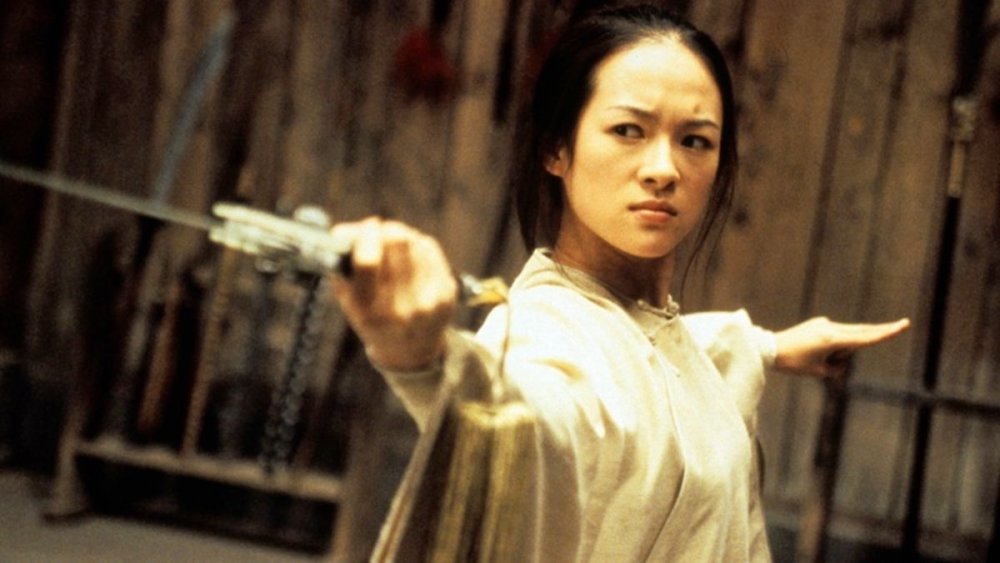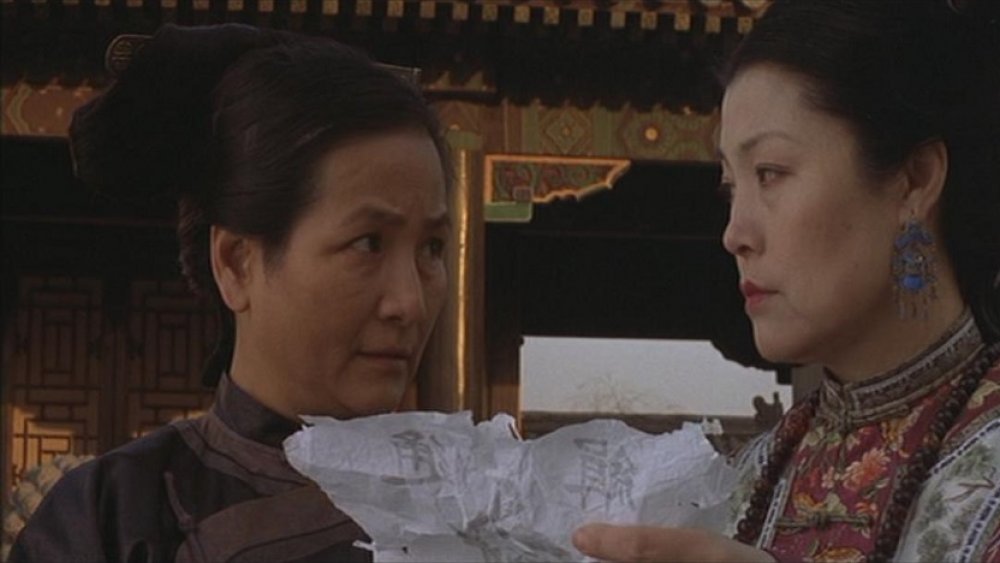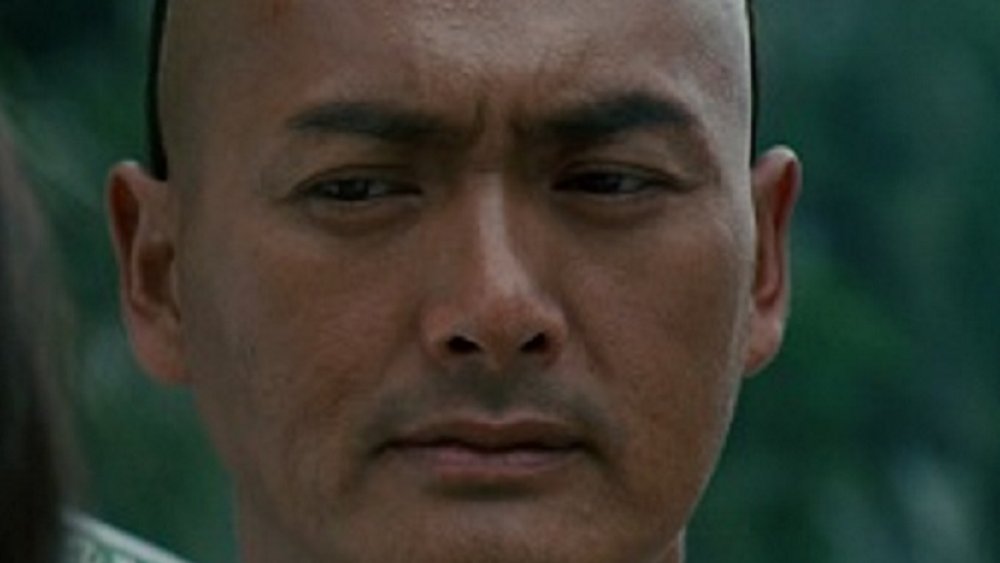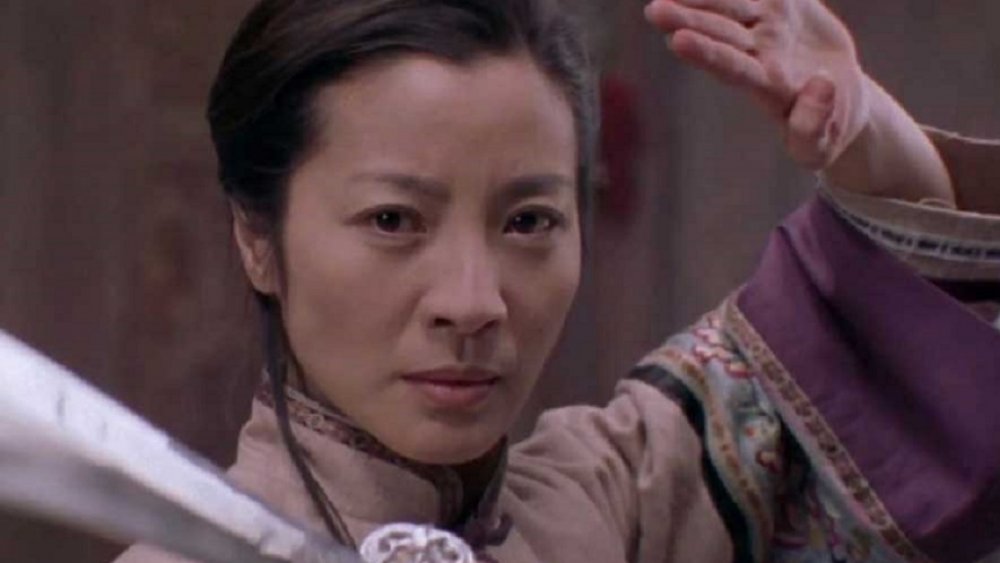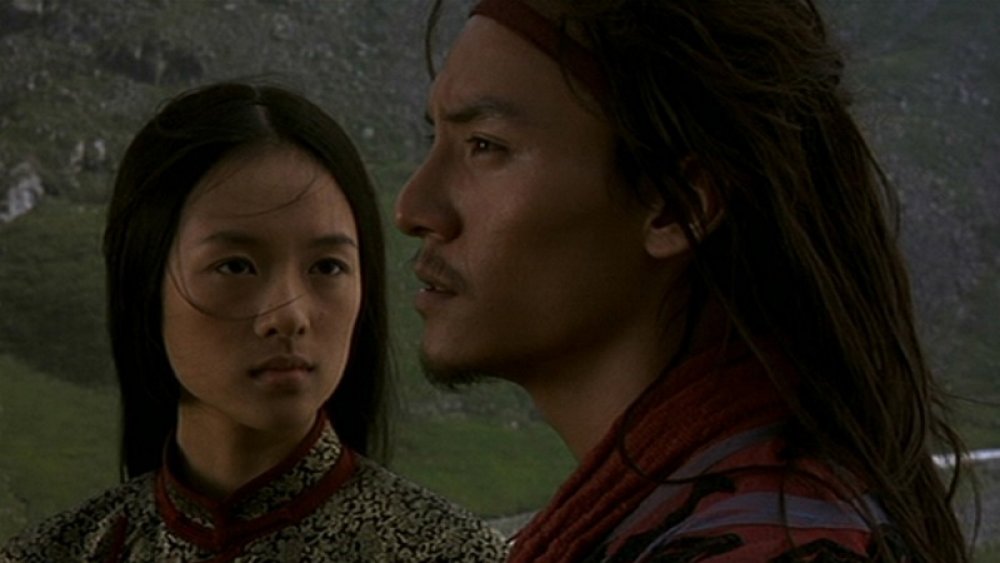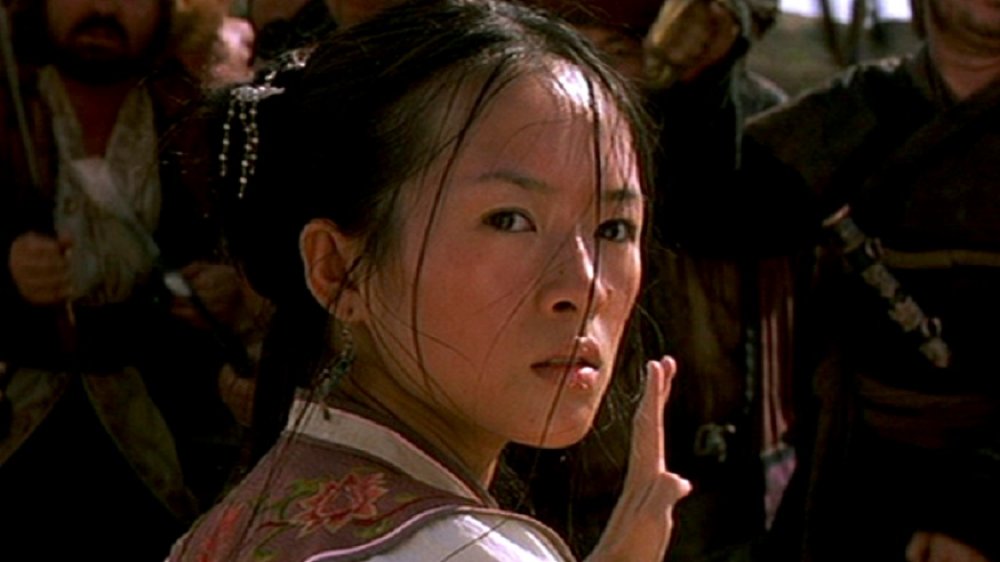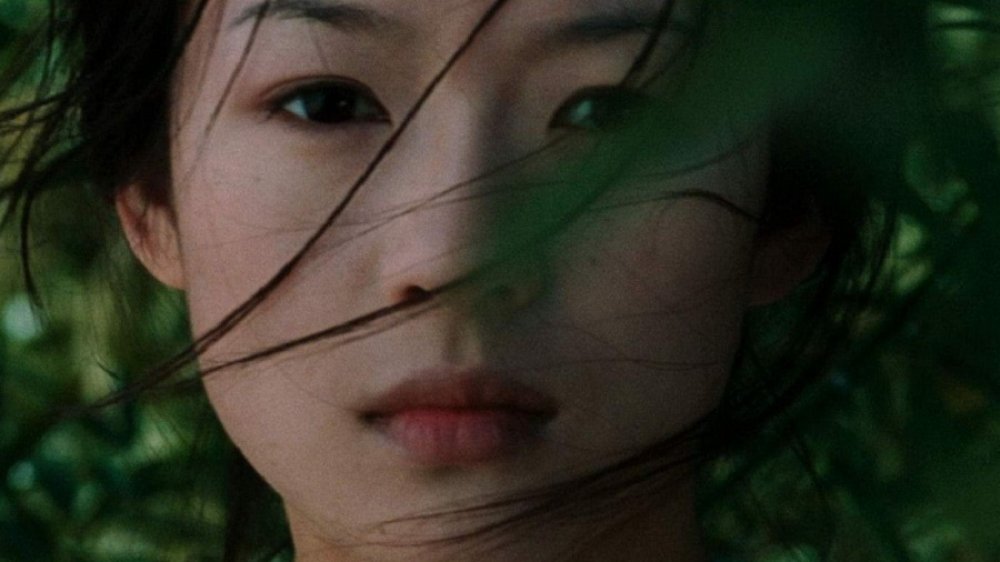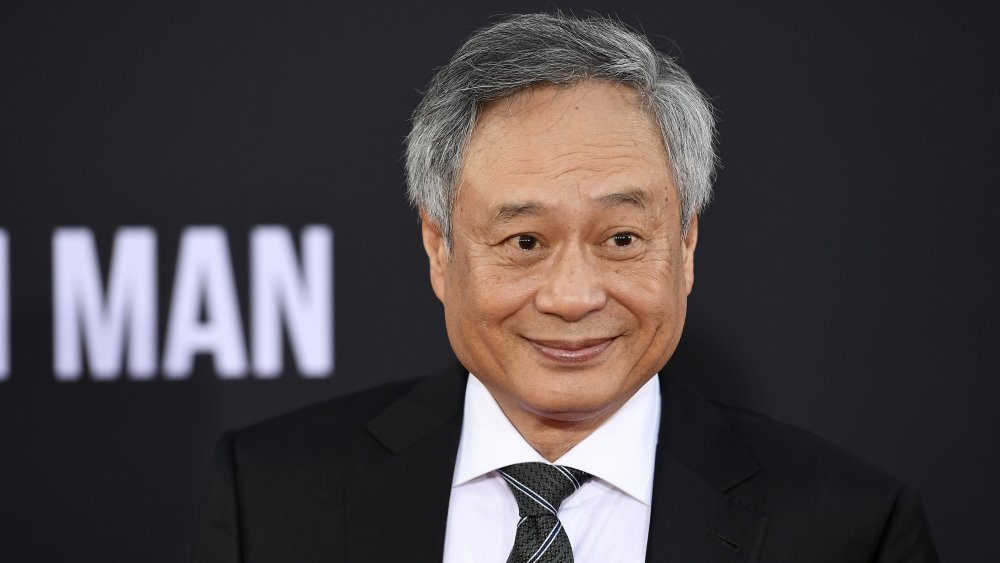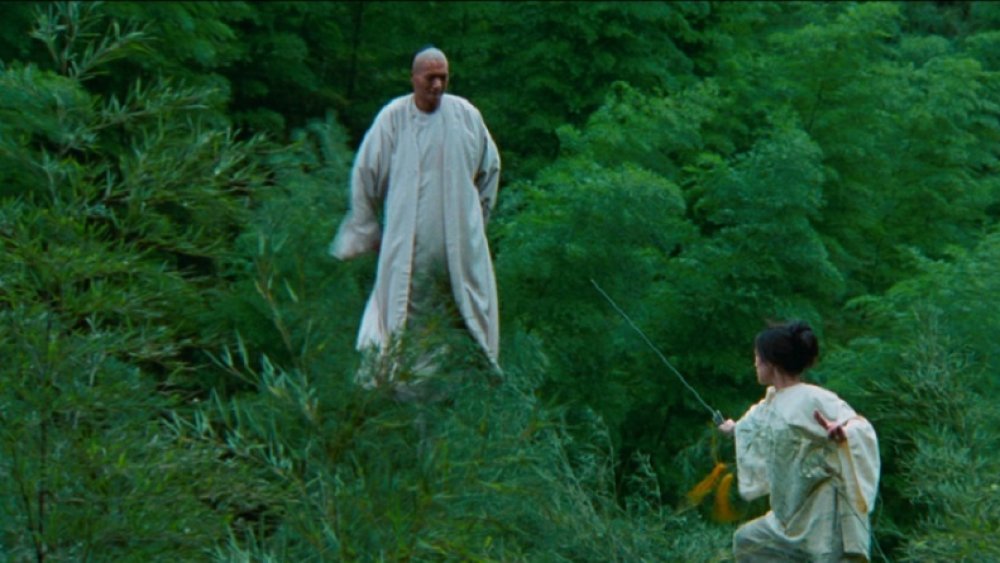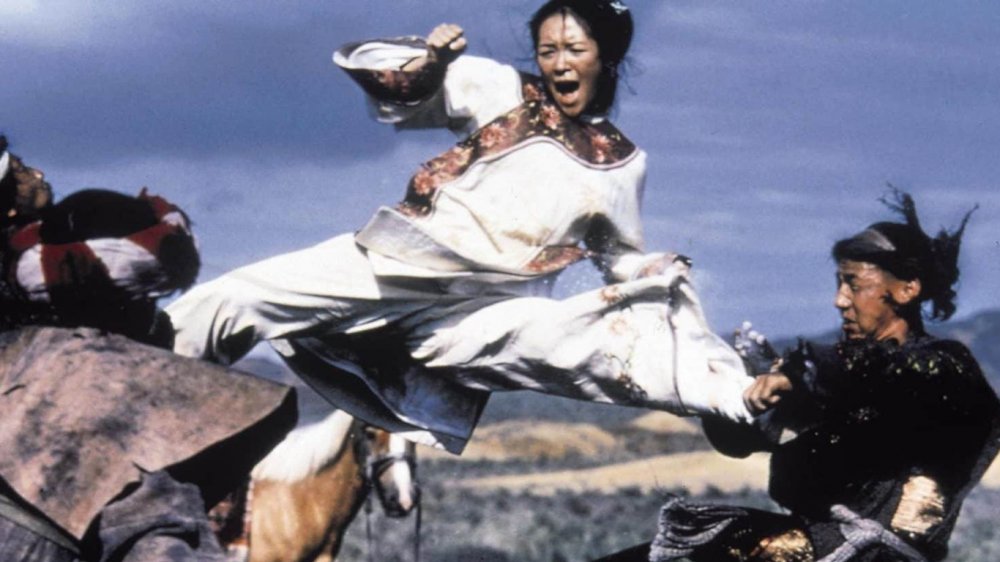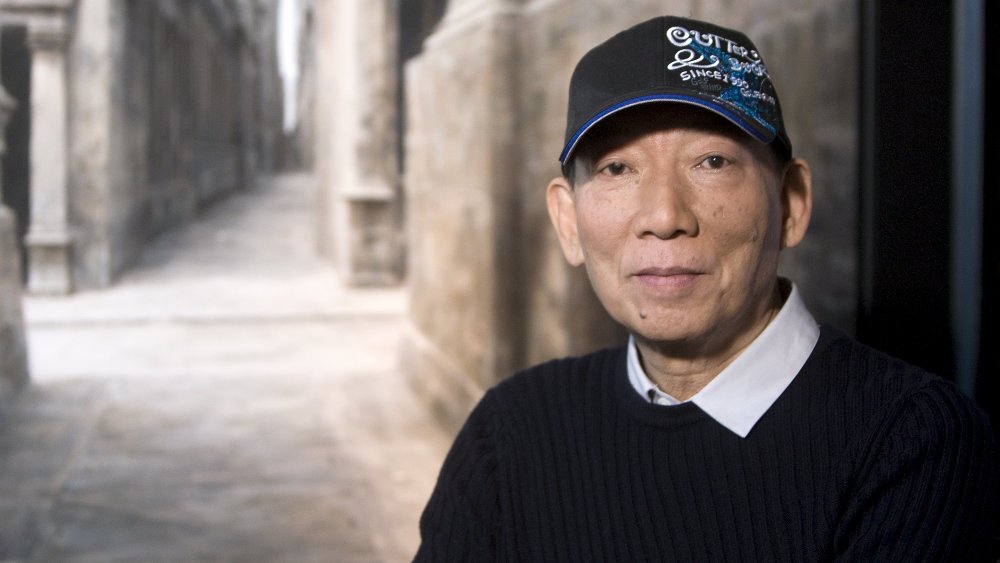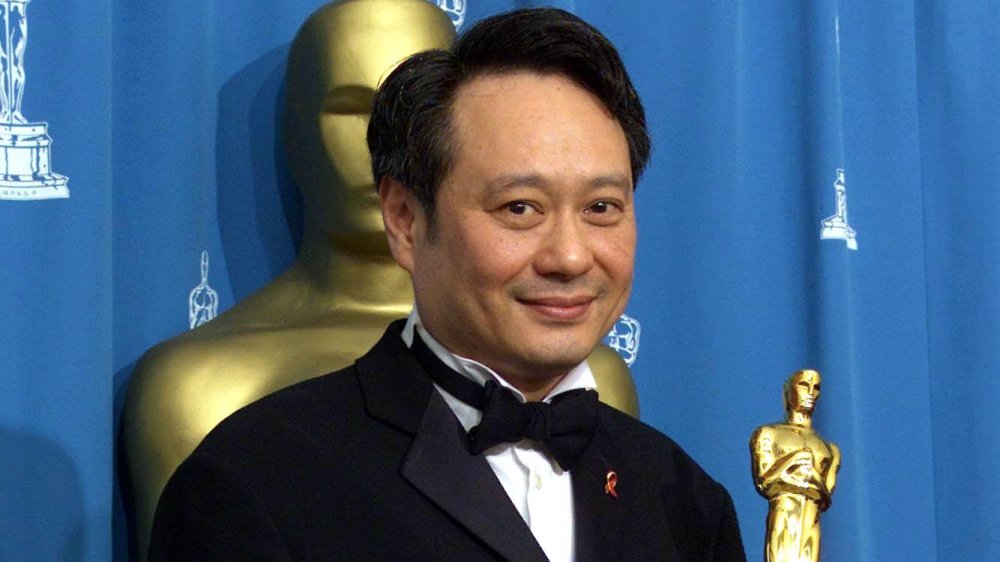The End Of Crouching Tiger, Hidden Dragon Explained
The 2000 movie Crouching Tiger, Hidden Dragon, directed by Ang Lee, was a surprise international hit. Set in 19th century imperial China, the story weaves in romance and melodrama with eye-popping wirework combat scenes. Master swordsman and monk Li Mu Bai (played by Chow Yun Fat) decides to give up his weapon, the powerful and ancient Green Destiny Sword. He's had enough of the warrior's life and is in love with fellow swordfighter and businesswoman Yu Shu Lien (portrayed by Michelle Yeoh). When he donates the sword to their mutual friend Sir Te, it's stolen by a young woman in disguise. This is Jen Yu (played by Zhang Ziyi), who is the daughter of a powerful governor and slated to be in an arranged marriage.
In a film where nothing is as it seems, Jen Yu's governess has secretly been training her for years in kung fu and sword fighting. The governess is the criminal and killer Jade Fox in disguise (played by Cheng Pei-Pei), who killed Li Mu Bai's master and many others. When Jen Yu steals the sword out of boredom, it triggers a series of events that are fatal for many of the characters. While a policeman and his daughter hunt down Jade Fox, Jen Yu's bandit lover Lo Dark Cloud (played by Chang Chen) pops up to declare his love for her again. After a number of fights, what becomes of the characters when Jen Yu runs away from her family?
What happens to Jade Fox?
Jen Yu reveals to her master that she could read the kung fu manual that Jade Fox had stolen. Jade Fox could understand the diagrams, but Jen Yu's ability to understand everything meant she had secretly surpassed her teacher years earlier. Jade Fox is enraged by this betrayal, and after she saves Jen Yu from drowning after a duel with Li Mu Bai, she drugs the girl she thinks of as her own child. This is after a lifetime of betrayals and poor treatment. She hated Lu Mi Bai's master because he was willing to sleep with her but not train her. She became a bandit to finally live a free life, but her guise as Jen Yu's nanny is just another form of bondage. She justifies it because of her relationship with Jen Yu, and when that's taken away, she lashes out.
She sets poison dart traps in her cave. One manages to kill Li Mu Bai, but not before he stabs her. While she's glad that her enemy is going to die, she reveals that Jen Yu was the one she really wanted to kill — "My only enemy." Her last request is denied. It is ironic that this thief and deceiver is hurt most by the lies of someone she cares about.
What happens to Li Mu Bai?
Li Mu Bai quits his monastery because there's something he can't let go of: his love for Yu Shu Lien. Despite knowing each other for years, they never got together because she was engaged to his brother, who died before they could marry. Out of societal obligation and guilt, they never took the first step, but he's ready at the beginning of the film.
Li Mu Bai is fascinated and distracted by Jen Yu, and it's clear that it's both as a kung fu master and as a man. He wants her to submit to him and become his disciple, which is just another kind of bondage for her. When she jumps after the sword when he throws it down a waterfall, it means that she may have lost the battle but wins the war.
It's clear that he understands that he's made a mistake and tracks her to Jade Fox's lair. When he frees her from her drug-induced haze, she pulls open her outer shirt and asks, "Is it me or the sword you want?" He ignores this and saves Jen Yu from Jade Fox's poison dart trap. In a spectacular sequence, he shunts aside all but one — and that's the one that kills him.
Jen Yu tries to atone for her behavior by retrieving ingredients for an antidote, but it's too late. With his dying breath, he tells Yu She Lien that he has always loved her and that he's wasted his life.
What happens to Yu Shu Lien?
Jen Yu immediately forms a bond with Yu Shu Lien at the start of the movie, saying "Let's be like sisters!" In many respects, they are mirror images of each other. Yu Shu Lien has the appearance of total freedom as a respected businesswoman, but she wasn't able to be trained with the monks on Wudan mountain, and she's expected to comply with the rules of society. Yu Shu Lien sees Jen Yu as a younger version of herself, one who has a chance of happiness in a conventional life.
After Jen Yu runs away and gets in trouble, she visits Yu Shu Lien for help. She receives assistance but also gets a lecture, saying that she has to return the sword and return to her family. That results in a huge showdown between the two and a lot of angry words. The selfish actions of Jen Yu result in the death of Li Mu Bai, just as he had declared his love for Yu Shu Lien. After his death, she picks up the Green Destiny sword, swings it at Jen Yu's neck, and stops short. She sends the sword back to Sir Te and tells her to go to Wudan mountain to be with Lo. She mourns her loss but ends the cycle of revenge when she spares Jen Yu's life.
What happens to Lo Dark Cloud?
Prior to the events of the movie, the notorious bandit Lo Dark Cloud attacks a caravan that happens to be carrying Jen Yu. The cheeky thief steals a valuable comb right out of her hands. Incensed, she hops on a horse and chases him across the desert, demanding the return of her comb. She grudgingly realizes that she has to rest for a moment with him, and he's clearly drawn to her immediately. She whacks him across the head and leaves, walking through the desert with no plan. He rescues her and nurses her back to health, and they fall in love.
Jen Yu is drawn to his sense of freedom and the life he leads. He tells her a legend that if anyone dares to jump from the mountain, God will grant their wish. When a young boy does it to save the lives of his parents, he knows it works the moment he jumps — he doesn't die, he just floats away, never coming back.
Lo sends Jen Yu back to her family, saying he's worried that she will get tired of being in the desert and he'll find her when he makes his mark on the world. He returns in the middle of the movie, and she rejects him. After one last try in public that nearly gets him arrested, Lo is sent to wait at Wudan and sees Jen Yu one last time.
What happens to Jen Yu?
The last scene of Crouching Tiger, Hidden Dragon has perplexed audiences for decades. After the deaths of her master Jade Fox and would-be master Li Mu Bai, Yu Shu Lien spares Jen Yu's life, saying she knows about Lo and he's waiting for her on Wudan mountain. Jen Yu makes the trek to the top and tearfully reunites with him.
On a bridge at the top of the mountain, she recalls his story of the boy who jumped off the mountain. She tells him to make a wish, and he says that he wants to be back in the desert with her like they were before. Jen Yu then jumps off the bridge and glides blissfully through the mists. Why does she leave Lo when it seems she finally gets what she wants?
What's clear is that going to Wudan is what both Lo and Yu Shu Lien wanted for her. What Jen Yu wants is made clear from the very beginning of the film, but no one is willing to give it to her until she seizes it in that moment: freedom.
What happens in the future?
With Li Mu Bai dead, Yu Shu Lien will mourn her friend and the love of her life. She will mourn what could have been if only either had had the courage to challenge what they saw as respecting tradition. She will at least have the solace of knowing how much Li Mu Bai loved her and the knowledge that she gave Jen Yu a chance at a different life — a life bound by love.
Lo's wish does come true, but not in a literal sense. He gets the knowledge that what he had with Jen Yu in the desert was real and that she loves him. She gives him a memory that will live forever.
Jen Yu will never return. She finally finds the freedom she wants so badly. It may be a selfish impulse, but she's also gone through life with everyone around her trying to control her. Her parents want to marry her off to a powerful family in order to improve her father's reputation, but don't care about her feelings. Jade Fox trains her in kung fu, but Jen Yu isn't interested in having a master. Li Mu Bai wants to control her and Yu Shu Lien wants her to be with Lo. Whether that jump is fatal for Jen Yu or is just a metaphor doesn't matter, because she's free.
How does this fit with other Ang Lee films?
In terms of genre, Ang Lee's filmography is truly all over the place. Ride with the Devil is a Civil War epic. Sense and Sensibility is an adaptation of the Jane Austen class-based romance. Hulk is a superhero movie. Life of Pi is a survival epic. Brokeback Mountain has a Western setting about a secret romance between two cowboys. Where does Crouching Tiger, Hidden Dragon fit in?
Lee's films all deal with what is below the surface. He's interested in people who have to hide their true selves or their true feelings. That's true in The Wedding Banquet, which is about a gay man getting into a marriage of convenience to please his parents. It's true in Brokeback Mountain, in which the men in question are drawn to each other despite wishing they weren't. It's true of Hulk, who has always been a metaphor for hidden anger. Sometimes these emotions are hidden because of family or class considerations.
Lee says in his films that nothing can remain secret forever, and you can only repress emotions for so long. They always emerge eventually. Every character in Crouching Tiger, Hidden Dragon has hidden feelings or secrets, and they all wind up being harmful. Li Mu Bai and Yu Shu Lien go years without acknowledging their feelings. Jen Yu hides her abilities from Jade Fox and yearns to find a way to be true to herself.
Chinese themes
"Crouching Tiger, Hidden Dragon" refers to Chinese mythology and hiding your strength from others. Jade Fox and Jen Yu both obviously hide their strengths from outsiders, and Jen Yu hides her true strength from Jade Fox.
Green is a color that represents the yin, or female aspect, according to Taoism. Ang Lee named the coveted sword the Green Destiny as a way of asserting Jen Yu's own yearnings and anger to determine her own destiny. Jade Fox is so named to indicate a darker, older shade of green. Her identity as a woman is crucial to the movie, because of how poorly she was treated by men.
The film popularized the wuxia genre internationally. As opposed to the gritty crime thrillers directed by John Woo and Ringo Lam in the 1990s, wuxia mines Chinese history for its martial arts action. Some of those films have deeply political themes, like the nationalist imagery of Hero. Crouching Tiger, Hidden Dragon instead focuses on the tension between family duty and historical misogyny that limits women's roles. The magical realist elements of the film, like the fighters walking on water and balancing on bamboo branches, serve to emphasize the emotional states of each character.
Arthouse miracle
Crouching Tiger, Hidden Dragon made over $128 million in America ($200 million adjusted for inflation) and over $213 million worldwide, all against a roughly $15 million budget. It's among the all-time "leggiest" movies, meaning the ratio between total domestic box office gross and their largest weekend gross. This means that the movie was popular over a long period of time or even gained popularity over time.
This reflects the movie's word-of-mouth success and appeal to a number of different audiences. It was initially a film slated for small, art-house theaters because of Ang Lee's reputation for films like The Ice Storm, but also because films released with subtitles tend to automatically wind up there. The wirework special effects and the relatability of the melodramatic aspects of the story clearly resonated with a lot of different people. The excellent acting and romance component were crucial aspects of the film, separating them from the more straightforward kung fu movies of the '70s and '80s.
Where did kung fu films go in America?
Crouching Tiger, Hidden Dragon also opened the door for a number of similar art-house action epics in America, with Zhang Yimou's Hero and House of Flying Daggers among the biggest successes. Rob Minkoff's The Forbidden Kingdom is another example. Something many of these films have in common is the imaginative, dynamic, and sometimes whimsical fight choreography. This was engineered by Yuen Woo-ping, whose name may not be familiar to Western audiences, but whose work certainly is.
He did the fight choreography for The Matrix, Kill Bill, and Kung Fu Hustle, directed Iron Monkey (another popular wuxia epic rereleased in America) and many other films. Realism was less important to Yuen than clarity and fluidity of motion. In many of his films, the exaggerated and magical action sequences can be seen as an extreme expression of the character's emotions, just as bursting out in song acts for musical theater.
What led to the ebbing of the art-house kung fu film? The most likely answer is the premiere of Iron Man in 2008. While superhero films started to gain traction right around the same time as kung fu films, the Marvel Cinematic Universe changed the game by adapting superhero stories around different genres. Captain America: Winter Soldier is a political thriller. Spider-Man: Homecoming is a high school romance. Ant-Man is a heist film. That flexibility and appeal to a worldwide audience copied Crouching Tiger, Hidden Dragon's playbook and took it in a different direction.
The legacy of Crouching Tiger, Hidden Dragon
Crouching Tiger, Hidden Dragon was nominated for ten Academy Awards and won four, including Best Foreign Language Film. It was even nominated for Best Film, which was nearly unheard of for a foreign language release. It's a rare example of a film being a huge box office and critical hit, as it piled up nominations and awards in a number of different countries.
More than 15 years later, a sequel arrived in the form of Crouching Tiger, Hidden Dragon: Sword Of Destiny. Directed by Yuen Woo-ping, it picks up where the first film left off, focusing on Michelle Yeoh's Yu Shu Lien character. The film focuses much more on action than the original; unfortunately, it failed to resonate with critics and audiences the way its predecessor had.
Twenty years after Crouching Tiger, Hidden Dragon's release, Korean director Bong Joon Ho's Parasite won Best Film at the Oscars. Parasite's triumph marked the first time a foreign language film won the coveted trophy, but Crouching Tiger, Hidden Dragon paved the way, bringing mature themes and melodrama out of the arthouse and into public consciousness while making every genre film director step up their game.
